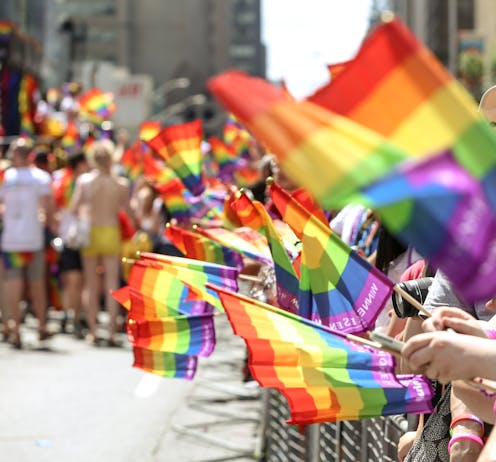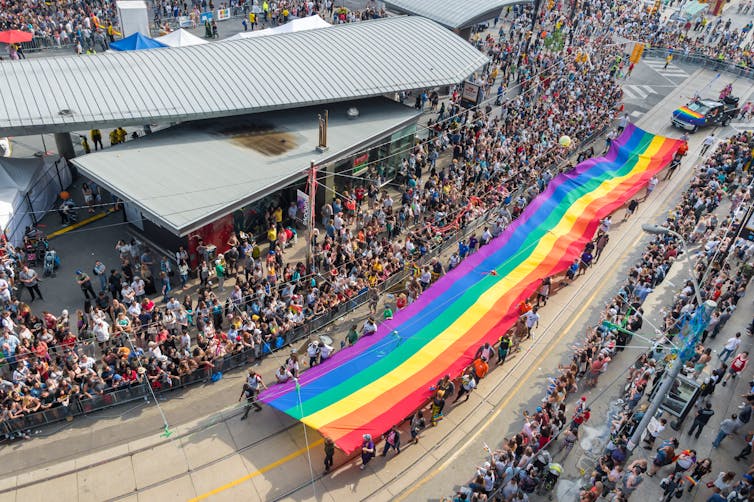
Pride Toronto has a history of whitewashing its past. From the the humiliation of the 1981 bathhouse raids, to the controversial ban of Queers Against Israeli Apartheid from the 2010 parade and more recently when the organization only narrowly voted to prevent uniformed police from joining the parade.
Pride is rooted in a history of anti-police and anti-prison riots and rebellions with racialized people as its protagonists. Pride was founded after the 1969 rebellion in New York City when police arrested and roughed up Storme DeLarverie.
Read more: Challenging the whiteness of queer organizations
This legacy demands Pride to work towards a decolonial future. However, a report released by York University historian Tom Hooper earlier this year solidifies that Pride Toronto not only continues to whitewash it’s past, it also replicates the colonial and racist practices and systems within Canada.
The report says Pride Toronto has been actively exploiting Indigenous labour and creative output. It provides examples of the organization’s contract with Indigenous artists Kent Monkman and Jason Baerg (Indigiqueer) as examples of this exploitation.
According to the report, Pride Toronto has also failed to transform its relationship with Indigenous people — not living up to the treaty of Niagara (1764) to share the land in the spirit of friendship, mutual benefit and respect.
Misleading and fraudulent
In his report, Hooper demonstrates that Pride Toronto had misled and fraudulently misrepresented the terms of its contracts with Indigenous artists and the progress on the work they had commissioned to secure a CA$600,000 dollar grant.
Pride Toronto secured the funding conditionally based on promising to collaborate with Indigenous artists. Artists, however, cancelled their collaborations due to lack of transparency.
The organization demanded full rights of ownership over the artists’ work in exchange for contracts. They misled the government, claiming support from several 2SLGBTQIA+ organizations by recycling old letters of support.
Pride Toronto also actively lied to Indigiqueer claiming that the funding had fallen through. The organization then claimed they had fully executed their contract with Monkman, despite Monkman cancelling all association with the project.
Extractive relationships
Pride Toronto’s demonstration of fiscal and moral corruption speaks to more than a lack of organizational transparency. It invokes the same exploitative colonial practices that extract value from Indigenous labour for private institutional gains and gives nothing to Indigenous people in return.
The organization’s demands for ownership over the product of Indigenous labour entrenches ongoing colonial expropriation of Indigenous work and art.
Since this report was released, Pride Toronto has issued an apology recognizing that this is an iteration of settler colonial harm, yet not much has been done in terms of reparations. The organization continues to snub racialized queer communities with little scrutiny and no commitments to materially compensate for the repeated exclusion and violence they’ve committed.
While the organization has become firmly institutionalized over the last several decades (for better or worse) the movement of queer resistance and Pride is rooted in police and prison abolition. By not materially supporting Black, Indigenous and racialized queer people, Pride Toronto will suffer the fate of irrelevance.
‘Moves to innoncence’
Decolonizing our relationships, as Eve Tuck and K Wayne Yang eloquently write, is not a metaphor. The harms queer settlers experience at the hands of homophobic social structures cannot be an alibi for our complicity in colonialism, something Tuck and Yang coin as “moves to innocence.”

As queer communities, we must end an imagined contradiction between Indigenous self-determination and queer rights. Whiteness is not a synonym for queerness. And an abolitionist vision of queer liberation must involve Black, Indigenous and racialized queer people. We have to reject simple inclusion as the solution to homophobic violence, and recognize the diversity of queerness across racial lines.
Decolonization is tangible, material work, that begins with transforming our relations as queer settlers with Indigenous people. It involves living up to treaty obligations, paying reparations to Indigenous people and stopping colonial theft.
After being called out, Pride Toronto has the opportunity to change its relationship with Indigenous and racialized people. It is a movement on stolen and unceded Indigenous lands, and as a social justice organization, it has the potential, capacity and obligation to address these histories with its work. So far, it hasn’t.
David Semaan does not work for, consult, own shares in or receive funding from any company or organization that would benefit from this article, and has disclosed no relevant affiliations beyond their academic appointment.
This article was originally published on The Conversation. Read the original article.







